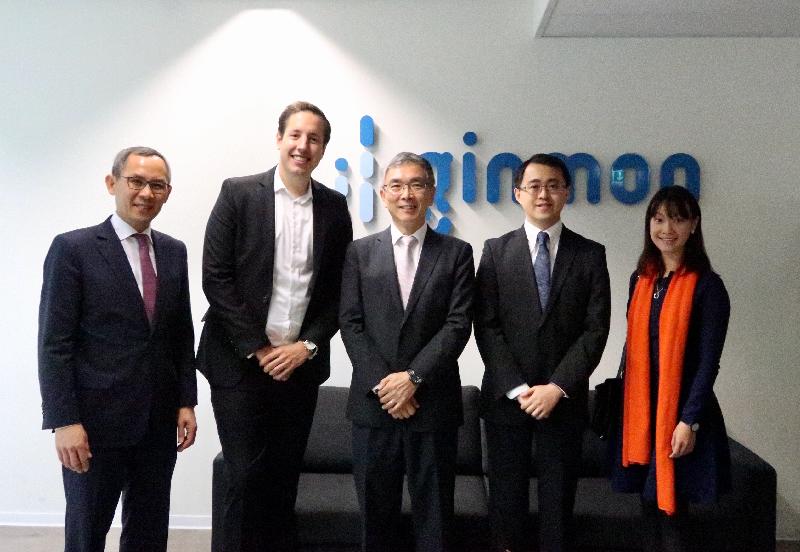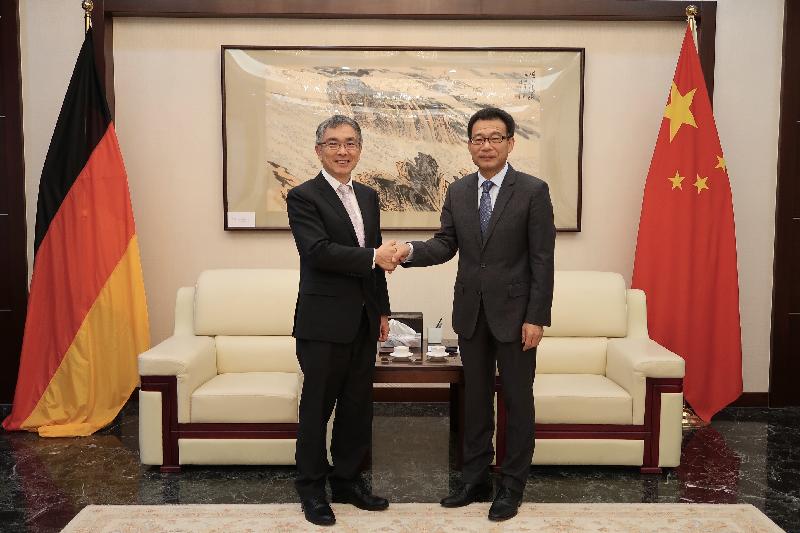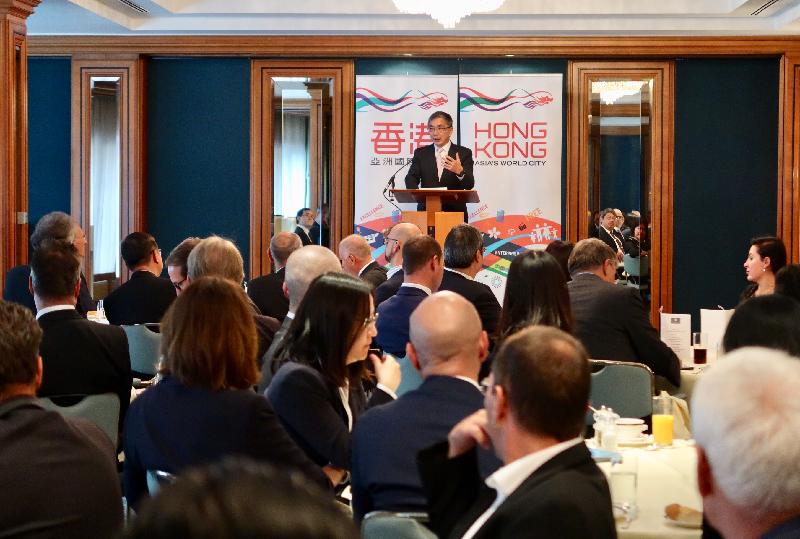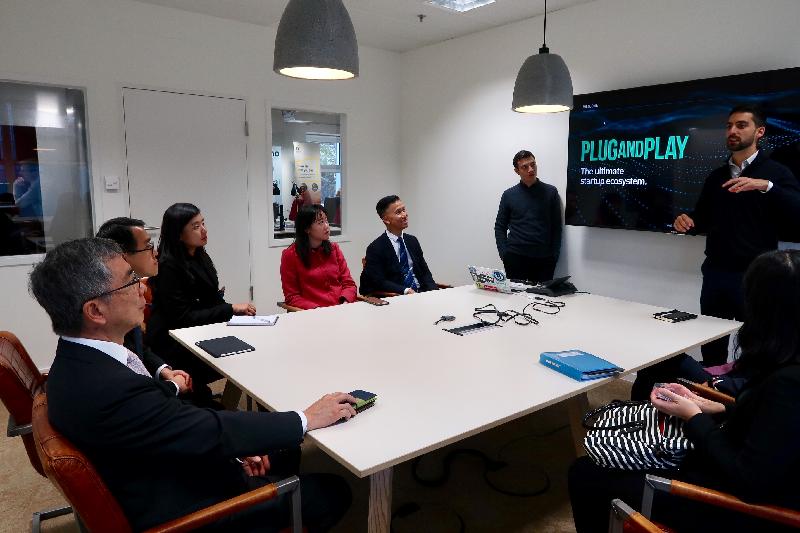Speech by SFST at business luncheon co-organised by Hong Kong Trade Development Council and Hong Kong Economic and Trade Office in Berlin (English only)
Following is the speech by the Secretary for Financial Services and the Treasury, Mr James Lau, at the luncheon co-organised by the Hong Kong Trade Development Council and the Hong Kong Economic and Trade Office in Berlin on October 23 (Frankfurt time):
Introduction
Good afternoon. I am delighted to join you all today in Frankfurt, the financial capital of the Eurozone. I was last in Germany in January last year, when I attended a G20 seminar and spoke at a panel on inclusive digital finance in Wiesbaden. Today I like to share with you the opportunities offered by Hong Kong, the leading financial centre of Asia.
Hong Kong is a gateway city with unparalleled connectivity to China, especially the Greater Bay Area near the Pearl River Delta in the south of China. Hong Kong also connects to the many countries in Southeast Asia, and to the economies along the Belt and Road Initiative.
As an international financial centre and a global metropolis for trade and commerce, Hong Kong is the ideal hub for you and your business to seize the opportunities arising from these exciting regional and international developments.
Indeed, Hong Kong's strength as one of the most business friendly economies in the world is well recognised. The 2018 Index of Economic Freedom Report issued by the Washington-based Heritage Foundation ranked Hong Kong as the world's freest economy for 24 consecutive years. The Canada-based Fraser Institute has also ranked us first in economic freedom since 1996.
Hong Kong ranked second in the 2018 World Competitiveness Rankings published by IMD, the International Institute for Management Development based in Lausanne. Hong Kong was also ranked seventh among 140 economies in the World Economic Forum's Global Competitiveness Report. Among the 12 pillars of this ranking, Hong Kong obtained the top rank in "Macroeconomic stability" and "Health", and second in "Infrastructure", "ICT adoption", "Product market" and "Financial system". These top scores reflect our competitive edges but we will also seek to improve on our competitiveness.
Hong Kong offers an internationally competitive tax regime, with companies paying no more than 16.5 per cent profits tax. In fact, this year we introduced a new two-tier tax system with 50 per cent tax concession on the first 220,000 euro of profits i.e. only 8.25 per cent. There is also no inheritance tax, no capital gains tax and no sales tax in Hong Kong.
Since China's resumption of exercise of sovereignty over Hong Kong in 1997, Hong Kong has functioned well under the principle of "one country, two systems". We have continued to thrive, flourish and participate in China's spectacular economic growth, while also maintaining our openness and connectivity, our rule of law, our status as a global financial centre, and our role as an international trade and logistics hub.
Our legal system is based on the common law. But we are unique in that our legislation is enacted in both English and Chinese, and both versions are equally authentic. This bilingual legal system suits both foreign enterprises and Chinese enterprises as they would feel more at home when operating in their own language.
Greater Bay Area
Now let me begin by talking about the Greater Bay Area in the south of China. This represents a huge market spread over 9 cities in Guangdong Province plus Hong Kong and Macau. In Europe, Germany is the only country that has a population larger than that of 70 million in the Greater Bay Area. The GDP of the Greater Bay Area is currently around US$1.5 trillion, comparable to that of South Korea and larger than Australia.
The essence of the Greater Bay Area initiative is to leverage the comparative advantages of the eleven cities to deepen co-operation, facilitate in-depth and organic integration, and to drive co-ordinated regional economic development.
Among the major cities in the Greater Bay Area, Hong Kong, as you know, is a global financial centre with a particularly vibrant equity market. In five out of the past nine years, Hong Kong came first in the global initial public offering (IPO) league table. We are also the most international city of China, and this complements other cities in the Greater Bay Area such as Shenzhen.
Shenzhen is ranked first by the California-based Milken Institute for economic performance among 34 first-tier and second-tier cities in Mainland China. Shenzhen is a leading innovation and technology centre where the new economy accounts for 38 per cent of its GDP, encompassing information technology, high-tech equipment manufacturing, green technology, and more.
Shenzhen is also home to familiar tech giants like Tencent and Huawei, as well as a good number of rising start-ups. Often called "the new Silicon Valley", Shenzhen spends over 4 per cent of its GDP on research and development, and its companies file more international patents than those in France or Britain.
Aside from Shenzhen, four other cities in the Greater Bay Area form a high-tech industrial belt, with expertise in artificial intelligence and robotics, software, integrated circuit design, mobile network, smart power grid equipment, bio-medicals, video gaming and industrial design.
In terms of physical connectivity, the Hong Kong section of the Guangdong-Shenzhen-Hong Kong High Speed Rail started service on September 23 this year. China's high speed rail network covers over 25 000 km, accounting for about two-thirds of the world's high speed rail tracks in commercial use. The 26 km section in Hong Kong links up with the rest of China and provides high speed and quality travel to complement air transport.
In addition, the Hong Kong-Zhuhai-Macao Bridge set to open tomorrow (October 24 Hong Kong time) will shorten the travel time between Hong Kong and the western part of Guangdong from four hours to only 45 minutes. The bridge spans 55 km, so you can actually organise a marathon event over there!
In terms of Hong Kong Government's policy focus for the Greater Bay Area, we are working with the Mainland government to foster freer flow of people, goods, capital and information through policy innovation. This will be implemented through measures that facilitate Hong Kong people to study, work or start their own business in the area.
Innovation is a key driver for developments in the Greater Bay Area. In Hong Kong, we are currently developing an 87 hectare Hong Kong-Shenzhen Innovation and Technology Park, with the goal of attracting top-tier enterprises, research institutions and higher education institutes from both sides of the Shenzhen River as well as those across the globe.
Authorities in Hong Kong and Shenzhen have signed an agreement to strengthen fintech co-operation between the two cities. They are working with Cyberport, which is a government-backed "creative digital community" in Hong Kong, to explore the feasibility of establishing cross-border soft landing facilities in Shenzhen, encouraging Hong Kong fintech firms to expand their business to the Mainland, and Mainland firms to establish themselves in Hong Kong.
In fact, the Hong Kong Fintech Week, which is opening next week, will include a day in Shenzhen, probably making it the first cross-boundary Fintech Week in the world.
Southeast Asia
Now let me turn to Southeast Asia, which is my second theme. While the Greater Bay Area no doubt presents extremely exciting opportunities, Hong Kong is also an ideal launch pad for German companies seeking to expand into Southeast Asia.
Indeed, Hong Kong enjoys close economic and trade relations with the ten ASEAN economies, and this is set to be further strengthened through a bilateral Free Trade Agreement and Investment Agreement signed in November 2017 and expected to enter into force in January 2019 at the earliest.
The Agreements are comprehensive in scope, encompassing trade in goods, trade in services, investment, economic and technical co-operation, dispute settlement mechanism and other related areas.
On trade in goods, the ASEAN Member States have agreed to eliminate or reduce their customs duties on all goods originating from Hong Kong. This covers different kinds of commodities, including watches and clocks, jewelry, articles of apparel and clothing accessories, toys, electrical machinery and equipment.
On trade in services, the Free Trade Agreement opens the doors for service sectors in Hong Kong to leverage their competitive advantages to expand into ASEAN. The service sectors that could benefit include professional services, business services, telecommunication services, construction and related engineering services, educational services, financial services, tourism and travel related services, transport services, and arbitration services.
Another important measure is the facilitation of entry and stay for business purposes. For example, Hong Kong business visitors will be able to stay up to 90 days in individual ASEAN markets. Furthermore, measures for investment protection mean that there will be fair treatment of Hong Kong investments and enhanced protection against non-commercial risks.
Last but not least, Hong Kong and ASEAN agreed to include the Economic and Technical Co-operation Chapter under the Free Trade Agreement, with plans to pursue projects in five priority areas, including customs co-operation, professional services, small and medium enterprises co-operation, trade facilitation and logistics, and e-commerce co-operation.
We expect that the trade and economic activities between Hong Kong and ASEAN will multiply much more after the Agreements come into force. So there will be more business opportunities for German firms operating in Hong Kong.
Belt and Road Initiative
My third theme is the Belt and Road Initiative that includes economies along the Silk Road Economic Belt and 21st Century Maritime Silk Road. The initiative accounts for 65 per cent of the world's population, one third of world GDP and one quarter of movement in goods and services globally, representing a large market with huge potential.
The Belt and Road Initiative aims to increase co-operation and integration through trade in goods, movement of capital and interaction among peoples. The goal is to build an inclusive and balanced co-operation framework that delivers benefits for all. As the leading financial hub in Asia, Hong Kong's experience, expertise and international outlook enable us to be a pre-eminent centre to service the diverse economies and their funding needs.
To begin with, Hong Kong can be a hub that connects regional and international stakeholders in infrastructure investments. According to the Asian Development Bank, as much as US$1.7 trillion a year will need to be invested in infrastructure in Asia until 2030. The Asian Infrastructure Investment Bank (AIIB) puts the estimate at an even higher figure of US$2.7 trillion per year.
Incidentally, Germany is an active member and supporter of the AIIB. Frankfurt in fact hosted in September 2015 a meeting of the chief negotiators that prepared for the establishment of the AIIB. And I was present as the Hong Kong representative.
Now, in order to give impetus to facilitate infrastructure investments and their financing, our central bank and banking regulator the Hong Kong Monetary Authority set up in July 2016 an Infrastructure Financing Facilitation Office. Around 90 key stakeholders, including multilateral development banks, financiers, pension funds, insurance companies, commercial banks, infrastructure developers, as well as professional services firms, have joined as partners.
In addition, in September last year, the Hong Kong Monetary Authority signed an agreement with the International Finance Corporation (IFC) of the World Bank Group, committing up to US$1 billion to the Managed Co-Lending Portfolio Program with the IFC for investment in infrastructure projects globally.
Another area where Hong Kong can play a major role is as the preferred location for corporate treasury centres. Corporations expanding into the economies along the Belt and Road will face a complex operating environment, including the challenges of multiple currencies and interest rate fluctuations. A need may arise to set up a corporate treasury centre to centralise financing, liquidity and risk management. Mainland enterprises have been showing increasing interest in setting up in Hong Kong.
Hong Kong's world-class financial infrastructure, availability of professional services and deep pool of financial talents makes us an ideal place for the setting up of a corporate treasury centre. What’s more, our legislature passed a law providing tax concessions for corporate treasury centres, which are taxed at only 8.25 per cent on their qualifying profits.
Finally, Hong Kong is the largest offshore renminbi centre, managing over 70 per cent of global offshore Renminbi payments. The renminbi is a potential currency of choice for the financing of Belt and Road projects, and Hong Kong has a wealth of RMB denominated products for financial transactions and risk management.
Importers and exporters in Belt and Road countries can settle their trade in Renminbi in our Real Time Gross Settlement payment system with more than 200 participating banks from all over the world. Investors in Belt and Road projects can tap our Renminbi liquidity through bank loans or so called "dim sum" bond issuance. They can also invest their surplus Renminbi liquidity in a wide range of Renminbi products available here in Hong Kong.
Hong Kong as a Welcoming Place for German Businesses
Now, having described Hong Kong's unique role as a gateway city to the Greater Bay Area, Southeast Asia and the economies along the Belt and Road, I would like to emphasise again our global outlook, international connections and cosmopolitan setting, such that Hong Kong is a welcoming place for German businesses, German institutes and German professionals.
Currently there are over 8 700 overseas and Mainland companies in Hong Kong. For German companies specifically, there are over 80 regional headquarters, 140 regional offices and 150 local offices in Hong Kong. Let me share with you a few recent initiatives by German companies in Hong Kong.
First, Siemens opened a Smart City Digital Hub in Hong Kong in December last year, in collaboration with the Hong Kong Science Park. The Hub is powered by Siemens' cloud-based Internet of Things operating system and is designed as an open lab that enables research and development in data analytics, smart building, smart energy and smart mobility.
My second example is about Lufthansa, which has in Hong Kong a wholly owned subsidiary Lufthansa Technik that provides aircraft maintenance services. Lufthansa Technik set up a regional hub for its component business unit in Hong Kong in 2016. Aside from the ease of doing business and our unrivalled geographical location, the company chose to set up in Hong Kong because of proximity to an existing repair facility in Shenzhen.
In news and media, your media giant Burda International set up in Hong Kong in 2011, launching a celebrity and luxury lifestyle monthly magazine in the city, which is just one of the close to 540 titles that it owns around the world. For Burda International, Hong Kong is a priority market through which they can expand into Southeast Asian markets.
In professional services, Frankfurt-based law firm CMS opened an office in Hong Kong in September 2016 focusing on International Arbitration and Finance. Citing the infrastructure projects in the Belt and Road initiative as an opportunity, the law firm leverages Hong Kong’s status as a leading international arbitration hub.
Finally, in research and development, two top German institutes, namely the Fraunhofer Institute for Production Technology and the RWTH Aachen Campus, embarked on their first overseas venture this month by opening a new centre in Hong Kong. By teaming up with our government-backed Hong Kong Productivity Council, they hope that the centre will be a springboard for co-operation with Mainland China in innovation and technology.
Conclusion
Ladies and gentlemen, I hope I have illustrated for you Hong Kong’s unique role as a gateway city to Mainland China, Southeast Asia as well as the economies along the Belt and Road. I encourage all of you to seize the abundant opportunities in the East, and I assure you that you will find yourself in good company with fellow Germans as well as other expatriates in our inclusive and international community. Thank you.



